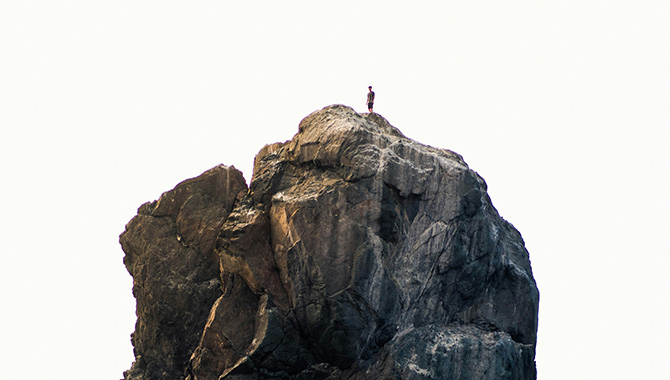The women had been saying to one another, “Who will roll away the stone for us from the entrance to the tomb?” ~ Mark 16:3
My father was a flatlander from a small farming community in the Land of Oz. After college, his job in the manufacturing division with Safeway took him down south to Arkansas, east to Baltimore, west to San Francisco Bay, and eventually to the Pacific Northwest. He loved every move, big adventures, new land, a growing young family, and a steady climb up the corporate ladder. And Mom bemoaned every move with the same refrain, “I want to go back to Kansas.” Dad just chuckled.
We lived in a non-descript farming community in the Northwest. Our small-town Grandview sat 804 feet above sea level which made it ideal for growing grapes, apples, and cherries; and the low elevation accentuated the majestic view and daunting enormity of Mount Rainer (14, 410’) which sat one-hundred and thirty- four miles northwest of Grandview. Mount Adams (12,276’), the Forgotten Giant of Washington, stood one-hundred and thirty-nine miles southwest of Grandview and dominated the western horizon with Rainer.
When Dad drove the old green ’65 Ford truck to work each morning, he kept a chart on the sun visor, and he wrote in pencil the date and whether he could see Adams and Rainer towering like Greek Gods from the west. In the truest sense of the word and I paraphrase John Muir, “The mountains were calling Dad, and he had to go.” Of course, Mom just wanted to go back to Kansas, so when Dad decided to climb Mount Adams, he told me the “obedient older son” that I was going with him.
I am thankful for that first trip up Mount Adams with my dad and several other members of a climbing group that he joined. One of my earliest and most lasting images of my father came from that climb.
It was late spring, too early really to ascend Adams. Deep snow covered the trail so whoever was in the lead had the arduous task of breaking the trail, sinking up to their calf or above their knee with each step. As the youngest member–early elementary school–of our party, I walked toward the back and enjoyed the benefit of everyone tamping down the snow ahead of me.
My dad walked just in front of me, showing me the way. He wore thick blue wool pants, a red and black checkered wool shirt over a T-shirt, and a light blue sun hat rested on his head. Dad had climbing boots which weighed a ton, and they were great on glaciers but horrible for walking mile after mile. We stopped every couple of hours, so he could apply moleskin to his latest blister, but nothing detoured his enthusiasm. We were going up a mountain!
Dad carried an old hand-me-down red Kelty backpack that someone gave to him for free. He had two full sized Sears and Roebuck’s sleeping bags (mine and his) strapped to the bottom of his pack with bungy cords. He fastened our three-man tent and a one-hundred-and-fifty-foot climbing rope on top of his pack along with two sets of crampons. He stuffed water bottles, food, and first aid supplies into the side packets. He looked like a gentle, indomitable giant walking up that mountain.
By contrast, I carried a canteen filled with cherry Kool-Aid and a small rucksack. I was weak and Dad was strong. I could not have made it up Mount Adams, a two-day climb through the forest and up glaciers without him carrying the bulk of the load and thank God for the people who broke trail ahead of us.
What can we do alone? Can we pull ourselves up by the bootstraps and do anything we set our minds to? Can we part the Red Sea? Can we walk on water? Can we love our enemies and forgive them? Can we raise ourselves from listless lives? Can we roll away the stones that entomb us?
On Easter morning three women walk to the tomb of Jesus hoping to embalm his body with spices. They are anxious. “Who will roll away the stone for us?” When they arrive, the stone has already been rolled away. “How?” asks Ronald Rolheiser. “We don’t know. Jesus’ resurrection happened with no one there.”
Rolheiser adds, “Scripture makes clear that Jesus didn’t resurrect himself. God raised him. Jesus didn’t roll away the stone, though that is what we generally assume. What difference does it make? Jesus did not raise himself from the dead and neither can we. That’s the point.”
“For the power of resurrection to enter us something from beyond us has to remove the huge, immovable rocks of our resistance,” writes Rolheiser. If we desire more love, more peace, and more joy in our lives and in our world, then we need a presence greater than us to help us remove the stones of unforgiveness, bitterness, and destructive ideas.
Who will roll back our stones? “We can’t open our own tombs,” says Rolheiser.
Richard Rohr adds, “Self-sufficiency makes God experience impossible. Jesus shows up in this world as a naked, vulnerable, defenseless baby.” He depends on others for his well-being. Do we think we can fix and “save” ourselves and others with sheer willpower? Or do we need help rolling the big stones of life away? Do we need support climbing the mountains we face in life?
Our personal strength and resolve are important, but “the power and grace of resurrection (new life) always comes to us from beyond. We never roll back the stone ourselves!” writes Rolheiser.
When we feel overwhelmed, when we bottom out, when we think we cannot move forward, may we surrender to a source greater than us that removes the stones which entomb us. May we live resurrection through Grace.
Blessings and peace,
Craig

